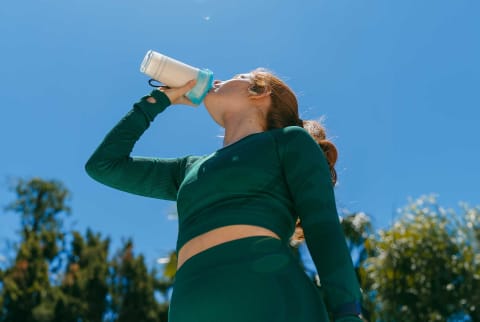Advertisement
Why Protein Intake Is Undeniably Connected To Fat Loss


For far too long, the rhetoric around weight loss has been less is more regarding food. This toxic mentality can not only interrupt sustainable weight changes but also feed a cycle of disordered eating patterns and fear of essential nutrients.
But this mentality is slowly shifting, much to the delight of nutrition experts like Stacy Sims, Ph.D. According to exercise physiologist and nutrition scientist, struggling to lose weight may mean you’re actually missing one macronutrient: protein. Here's a recap of her research-backed claim on the mindbodygreen podcast.
The link between protein and weight loss
Sims references a 2020 randomized controlled study1 on protein and body composition in women. The researchers altered protein intake in sedentary women with obesity and a high amount of fat cells within their muscles.
The team increased protein intake for half of the participants to 1.8 grams per kilogram of body weight per day (a high-protein diet) and for the others, the standard protein intake of 0.8 gram per kilogram.
"Over the course of 12 weeks, without any exercise at all, the women on the higher protein intake completely recomposed their bodies," she explains. While their weight didn't necessarily change, their body fat sure did: Instead of having 30 to 35 percent body fat, they dropped down to 20 percent.
Pretty impressive, no? And when you add consistent exercise to the equation, the odds for healthy weight loss and more lean muscle gains are only going to increase.
So, how much protein do women need?
Sims is well known for setting the record straight regarding gender differences in research, as she did when discussing protein. "What I want women to understand is when you look at the RDA for protein in the U.S., it is based on sedentary older men," she notes.
Regardless, for both men and women, the RDA is set for a sedentary person to avoid malnourishment—not thrive. And once you add activity and younger muscle to the mix, protein needs go up.
Instead of the current RDA (0.8 gram per kilogram), Sims declares women who are physically active need a minimum of 1.6 to 1.8 grams per kilogram of body weight. And once you enter peri- and postmenopause, it's closer to 2.2 to 2.4 grams per kilogram, she notes.
As far as timing goes, she encourages people to prioritize post-workout protein for prime muscle gains. The ideal serving for premenopausal women tends to be about 30 grams to continue muscle protein synthesis for up to 24 hours, and 40 grams in late peri- and postmenopausal women. This increased need for protein after menopause has been linked to hormonal changes2 that take place, so it's not the same for men.
Tips to eat more protein
For those who have been sticking to the RDA, reaching these high-protein goals can seem quite daunting. Here are a few tips from certified holistic nutritionist Melissa Boufounos, CHN, to get you started (and find even more tips here):
- Include a protein-rich food with each meal and snack.
- Start your day with a hit of protein by stirring unflavored collagen into coffee, oatmeal, or a smoothie.
- Swap white rice for quinoa to get almost double the protein.
- Stock up on carbs that double as good protein sources (beans, lentils, chickpeas, etc.).
- Add beans or lentils to soups or pasta dishes. (Swap half the meat for lentils to make a hearty Bolognese sauce!)
As you can tell, encouraging healthy weight loss and muscle gains doesn't have to always be about restriction. In fact, adding more protein to your diet is something Sims recommends for most women out there.
The takeaway
When it comes to lowering body fat percentage, Sims recommends upping your protein intake. This may sound counterintuitive, given the toxic diet culture norms encouraging over-restriction, but it's the science-backed truth. For more nutrition and exercise tips for women, tune into the podcast episode below: